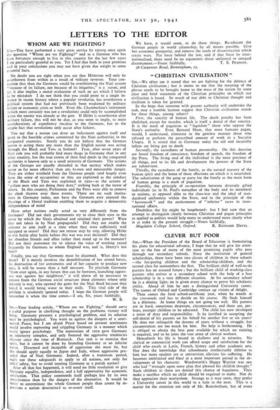LETTERS TO THE EDITOR
WHOM ARE WE FIGHTING ?
SIR,—You have performed a very great service by raising once again the question " Whom are we Fighting?" and as a German who has been fortunate enough to live in this country for the last few years I am particularly grateful to you. Yet I feel that both in your premises and in your conclusions you may not have given due weight to some essential facts.
No doubt you are right when you say that Hitlerism will only be overthrown from within as a result of military reverses. Your con- tention that then the Germans would be overthrowing the Nazi system " because of its failure, not because of its iniquities," is a ruism, and yet it also implies a moral evaluation of such an act which I believe to be mistaken I do not think that you could point to a single in- stance in recent history where a popular revolution has overthrown a political system that had not previously been weakened by military failure or economic crisis or both. Even Mr. Chamberlain's retirement (which most certainly was not a revolution) could only be accomplished when the enemy was already at the gate. If Hitler is overthrown after military failure, this will not be due, as you seem to imply, to mere considerations of expediency peculiar to the Germans, but to the simple fact that revolutions only occur after failures.
You say that a nation can draw an indictment against itself and point to the horrible crimes committed by the Nazi authorities in the conquered countries. Surely you do not believe that the German nation is acting there any more than the English nation was acting through the Black and Tans in Ireland? True, after seven years of Nazi rule you will probably rind more thugs in Germany than in any other country, but the true extent of their foul deeds in the conquered territories is known only to a small minority of Germans. The actions of the Gestapo are usually shrouded in that secrecy which makes terror so far more effective than any known and measurable danger. They are either withheld from the German people (and largely even from the army of occupation) or they are explained as the conduct of the Black and Tans was explained in 1920—as the actions of " gallant men who are doing their duty," striking back at the terror of others. In this country, Parliament and the Press were able to remove the cloak thrown over these events. There are no such institu- tions in Germany today, nor have the Germans ever enjoyed the blessings of a liberal tradition enabling them to acquire a democratic independence of mind.
Have other nations really acted so very differently from the Germans? Did not their governments try to close their eyes to the terror by which the Nazis obtained and retained their power? Were they not taken in by Nazi propaganda? Did they not enable the monster to arm itself at. a time when they were sufficiently well equipped to resist? Did they not retreat step by step, allowing Hitler to win battle after battle before this war was ever declared? Did they not abandon friends and allies rather than stand up to the monster? Did not their statesmen try to silence the voice of warning raised frequently by Germans to whom England was, and is, liberty's last hope?
Finally, you say that Germany must, be disarmed. What does this mean? If it merely involves the demobilisation of her armed forces, the destruction of her armaments and of her capacity to produce new ones, it will be worse than a half measure. To preclude Germany "from ever again, in any future that can be foreseen, launching aggres- sive war against her neighbour," it will above all be necessary to remove from the German social structure those elements whose only industry is war, who opened the gates for the Nazi flood because they hoped it would bring water to their mills. This vital side of the problem is resolutely ignored today. I hope the German people will remember it when the time comes.—I am, Sir, yours faithfully,
W. B.






























 Previous page
Previous page